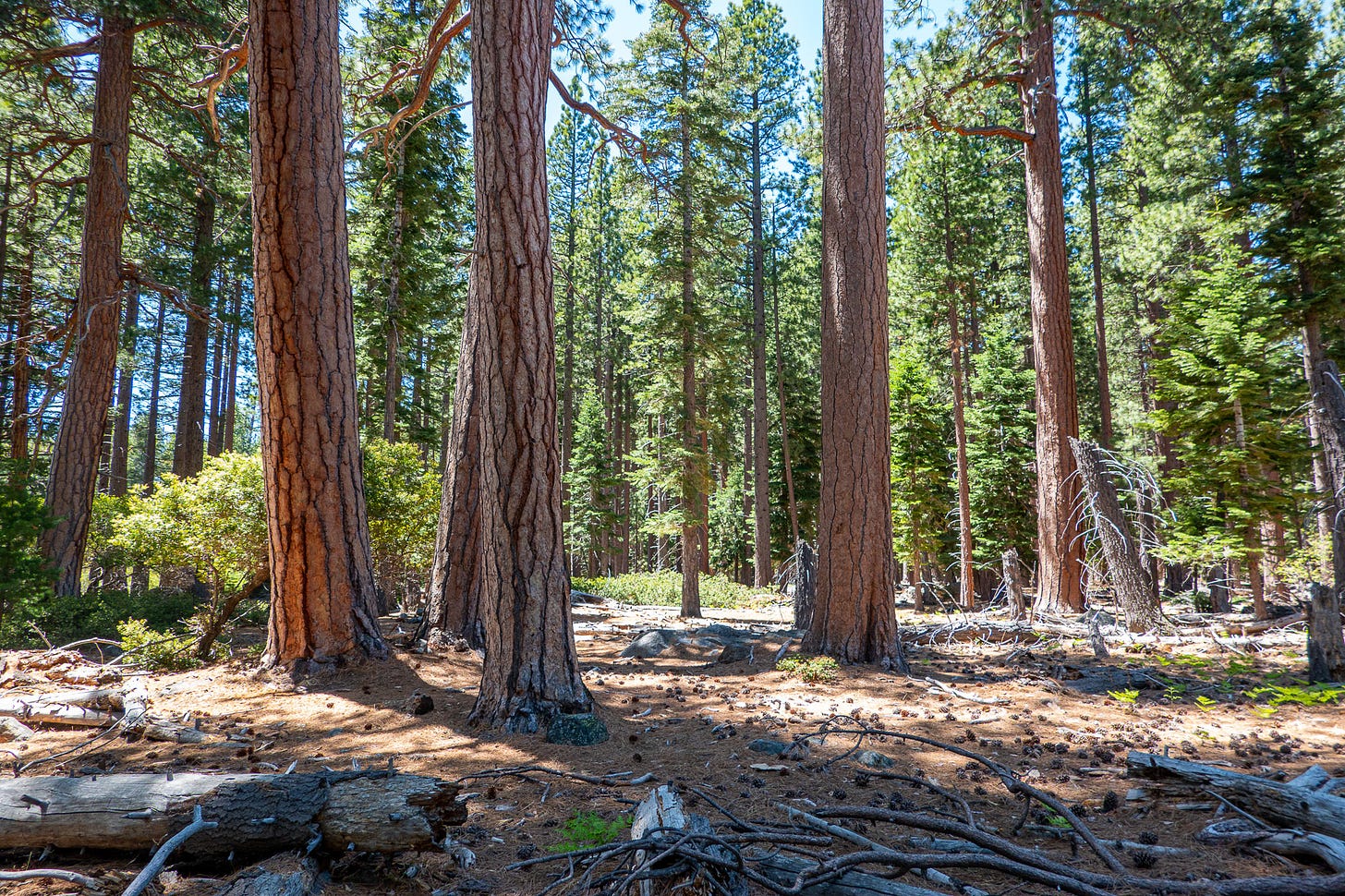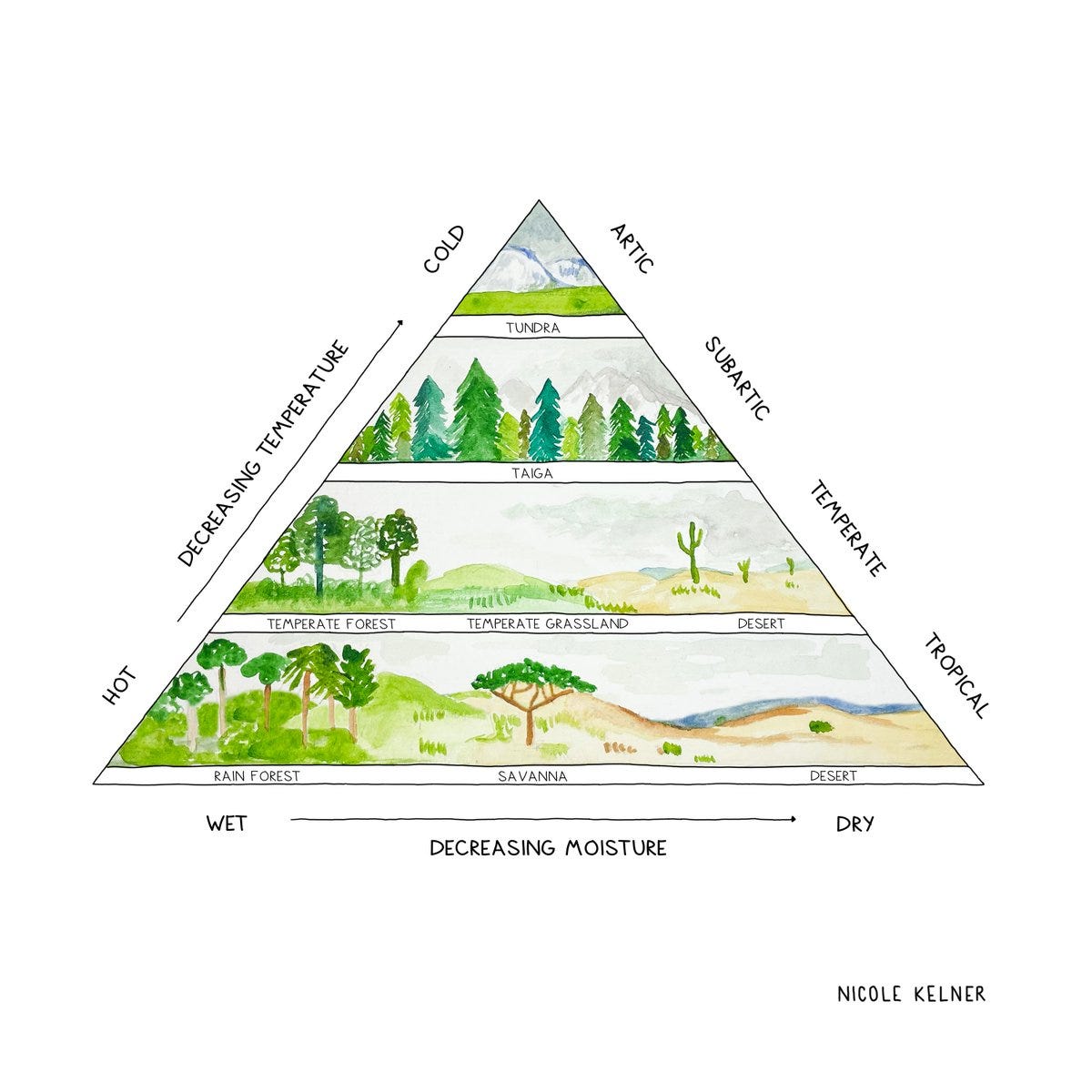California's Forest Management: Changes Needed to Drive Greater Collaboration and Results
by Allison Wolff, CEO and Co-Founder of Vibrant Planet
Forests make up 31% of the land on our planet and play an outsized role in sustaining life on Earth. They regulate global weather patterns, store roughly one-third of the carbon emitted by humans every year, and host 80% of terrestrial biodiversity. Seventy percent of the water humans use for agriculture and drinking originates in or is produced by forests.
Forests are our lifeline, and we're losing them at a catastrophic rate.
Forest management practices combined with climate change has resulted in major losses in forest cover and degraded forest ecosystems worldwide. Under our watch, 80% of the world's forests have been destroyed or irreparably degraded. In many western North American forests, for example, the exclusion of fire, thanks to fire suppression policy and development, has removed the most important driver of nutrient and water cycling, habitat creation, and fuel reduction. After more than a century without fire, forests are unnaturally dense and water stress is high. Insect and disease outbreaks are widespread, and modern wildfires in these unresilient forests are catastrophic, ecosystem transforming events.
As a result, the carbon emissions that would otherwise be captured end up in the atmosphere warming our planet. As temperatures rise, and as we continue suppressing fires, fuels only increase as does the prevalence of wildfires which further destroy our forests. It’s a disastrous cycle.
For example, between 1985 and 2021, California lost 6.7 percent of its tree cover. Nearly six million acres burned in the past 16 months, putting the state on pace to lose most of its forests to wildfires in the next 10-20 years.
Dynamic, coordinated land management and strategically prioritized resources, including carbon finance, for forest restoration efforts is the solution to restoring these important habitats, but we are at a critical point where it'll be too late if we don't act now and at scale.
Forest Management Logjams
California must restore 12-25 million acres of forest over the next ten years. But right now, the state only restores about 150k acres annually. Slow, siloed, poorly-funded planning coupled with lagging resources for restoration caused the state to fall significantly short of its forest treatment goal of one million acres per year.
Getting competing visions to reach consensus is no easy task making forest planning time- and cost-intensive. A 20,000-200,000 acre landscape can take two to ten years and several million dollars to complete, before legal challenges that often arise because stakeholders can’t effectively cooperate on a shared vision for a cross-jurisdictional landscape.
The Solution: A Visual Tool for Collaboration, Prioritization, & AI-Powered Insights
This planning gridlock is happening while at-risk forests continue to burn, altering the landscape – and climate – requiring stakeholders to effectively start planning from scratch time and time again, sending public money and precious time down the drain.
But with the emergence of innovative technologies like LiDAR and artificial intelligence, we can achieve never before seen insights into our forests and adapt treatment plans based on changing conditions.
At Vibrant Planet, we've leveraged these technologies to map out every tree in California, providing a comprehensive, high resolution view of our forests. This vital information, housed in a user-friendly interface, allows natural resource managers in fire dependent forests to create forest treatment scenarios in real-time and adapt plans based on monitored landscape conditions and restoration progress. This adaptability is critical to breaking through the planning gridlock to deploy and sequence treatment plans efficiently.

Our platform works to make restoration planning more collaborative by enabling various stakeholders to create treatment plans that balance their priorities in weeks rather than years. By leveraging a tremendous amount of data, we can help prioritize where and how funding and human resources should be deployed to minimize risk and maximize carbon, water, and biodiversity benefits.
Natural Climate Solutions
Natural climate solutions are becoming increasingly vital as policy makers nationally and abroad recognize the links between natural ecosystems, climate change and human well-being. More frequent and intense extreme weather events globally provide harsh evidence that climate change is already wreaking havoc on living and built systems, and will only worsen under business-as-usual approaches.
With tree-level data and VP’s landscape treatment prioritization power, natural resource managers can visualize, measure and enact natural climate solutions that produce ecosystem services such as GHG emissions reductions, carbon sequestration improvements, along with reliable water availability and biodiversity.
With credible and consistent monitoring, reporting, verification (MRV) systems to grow investor confidence in forest carbon markets, VP can also help unlock billions in funding to protect, restore and enhance forests. Blue Forest Conservation estimates that restoring California’s most at risk forests requires $58B of funding deployed within the next decade. And forests aren’t restored just once, they grow back and must be managed (as Indigenous tribes tended them for 20,000 years), so ongoing forest finance from the private sector, tied to ecosystem services like carbon storage, water reliability, and biodiversity conservation, is critical to unlock.
By providing a platform to visualize future restored forests, find forest restoration opportunities, and connect restoration to fungible benefits we can deliver forest health, minimize the risk of catastrophic wildfire, preserve our forests and their ability to store carbon, deliver clean water, and support biodiversity, local economies, and recreational habits for generations to come. That’s the goal but we’ve got to move with speed and at scale (that’s for you John Doerr).
✍️ The Draw-down
Weekly climate art by our MCJ Artist-in-Residence, Nicole Kelner.
📢 Climate Action of the Week
Want to do more? Sign up for the next Climate Changemakers Hour of Action here.
The U.S. House election in NC-13 is a toss-up this year, and we've got a stellar climate candidate in Wiley Nickel. This week, write letters to voters in North Carolina or fundraise for Wiley using our playbooks.
🔎 Fresh Takes
From our marketing friends at The Regenerates.
So many conversations in climate change focus on the external: actions, solutions, different ways of doing. But what about different ways of being and thinking? We spoke with Bristol Baughan, documentary filmmaker turned regenerative mindset coach, about why inner work deserves our attention. Read more
🍿 The Leanback
Learn about MicroByre this week with Pique Action’s mini-documentaries.
🎙My Climate Journey Podcast
🏆 Jason spoke with Marcius Extavour from XPRIZE about the organization’s climate competitions, including their $100M prize for carbon removal, the largest incentive prize in history funded by Elon Musk and the Musk Foundation.
🔋 Cody caught up with Mujeeb Ijaz from ONE about the company’s audacious goals to double the range of EV batteries to 600 miles using safe and sustainable materials.
✨ Highlights

📋 If your an MCJ member and haven’t done so already, please fill out the MCJ annual survey! We use this survey to provide better services and offerings to the community.
🌎 The gener8tor Sustainability Accelerator is currently recruiting for the Fall 2022 cohort. This is a 12-week program for early-stage sustainability and climate tech startups from across the world. Applications are due by 8/01.
👩💻 Climate Jobs
For more open positions, check out the #j-climatejobs channel in MCJ Slack as well as past newsletters.
Arcadia Science is seeking an Entrepreneur-in-Residence to join them in developing a new model for spinning out companies based on internal scientific research. (San Francisco, CA)
Cleartrace is looking for a Marketing Specialist to help organizations decarbonize their operations. (Austin, TX/Remote)
David Energy is hiring a Senior Product Manager - Residential to help customers in underserved areas decrease their emissions and bills while increasing their energy resiliency. (Brooklyn, NY/Remote)
Dispatch Goods is hiring a Head of Processing Operations to help eliminate packaging waste by designing and building an infrastructure for reuse. (San Francisco, CA/Hybrid)
Euclid Power is looking for a Director of People & Talent and Senior Product Designer to facilitate their energy storage efforts. (NYC/Remote)
Foresight Management is hiring a Director of Operations to join their energy and sustainability consulting team. (Grand Rapids, MI/Hybrid)
Greentown Labs is seeking a Senior Director of Facilities to oversee and coordinate improvements for their climatetech startup incubator space. (Somerville, MA)
Helio is looking for a Net Zero Home Assessor to join their electrification efforts. (Denver, CO)
👉 Events
For more climate events, check out the #c-events channel in MCJ Slack.
Barriers to Working In Climate Webinar by Climate People (7/26)
🎨 MCJ Climate Art Workshop: Plastic Free July with Arist-in-Residence, Nicole Kelner (7/26)
MCJ Vancouver Meetup (7/27)
Climate Voices is a free weekly email curating news, jobs, My Climate Journey podcast episodes, and other noteworthy happenings in the MCJ member community.
💭 If you have feedback or items you’d like to include, feel free to reach out.
🌳 If you’d like to become an MCJ community member, apply today.




